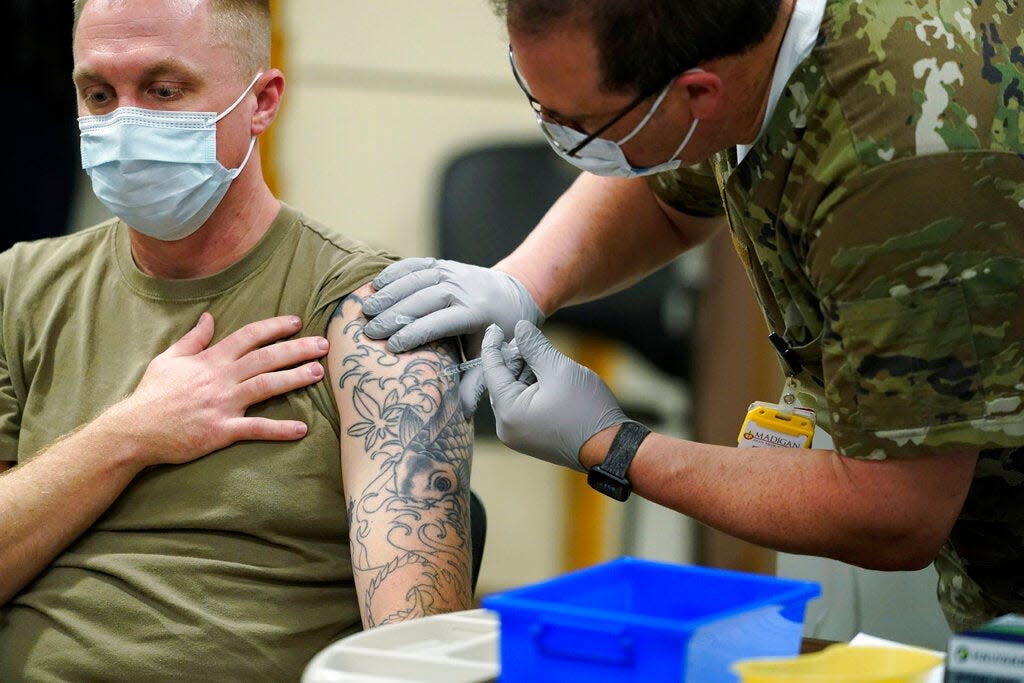RSV, COVID-19, flu and more: What's new with vaccines available this fall

- Oops!Something went wrong.Please try again later.
Fighting colds and flu comes along with follows weather that drives us into tighter quarters. We’re in a different landscape now and need to protect ourselves and families on several fronts — fall flu season is coinciding with likely surging COVID-19 cases and recent flares of respiratory syncytial virus (RSV). Yet there’s some good news about new immunizations, updates to existing vaccines and some simple ways to keep yourself and your family safe and healthy from winter viruses and more.
Use the simple lines of defense: Germs that can infect the respiratory system are frequently spread through mucus and saliva when a person coughs, sneezes or talks. Tiny droplets can suspend in the air or land on surfaces. That means their transmission can be reduced by washing your hands frequently, covering coughs and sneezes, minimizing close contact with others who are sick, wearing masks in crowded spaces, staying home when you are ill and keeping your kids home when they don’t feel well.
Here are a few common ailments during the fall and winter, and the latest information about vaccinations for each.
Respiratory syncytial virus (RSV)
RSV is a common respiratory virus in both kids and adults that causes cold-like symptoms. RSV symptoms usually go away on their own in one or two weeks, but it can cause severe illness, particularly in younger children and older adults.
In the U.S., around 58,000 to 80,000 children younger than five years old are hospitalized each year because of RSV and hospitalization rates are particularly high for babies younger than six months. There weren’t as many RSV infections during the pandemic, so many kids don’t have natural immunity and last year we saw a severe RSV season with many hospitalizations.
What’s new: The good news is, the Centers for Disease Control (CDC) has recommended two new RSV vaccines for adults aged 60 and older and an immunization to protect newborns and children up to two years old. Available this fall, these immunizations have all been shown to reduce the risk of hospitalizations and severe illness and reduce RSV illness that requires health care visits.
The new infant immunization, Nirsevimab (also called Beyfortus) is recommended for all infants under 8 months, for those born during this RSV season, and for some older babies at increased risk of severe illness caused by RSV. An RSV vaccine for pregnant people was also recently approved and recommended to provide protection to newborns.
COVID-19
Vaccination remains one of the most powerful ways to protect our communities from serious illness due to COVID-19, which continues to circulate in our communities, schools and neighborhoods. New variants are emerging that are even more contagious than the original virus, so even those who have had vaccination and/or have some natural immunity from a COVID-19 infection are still at risk of severe illness, hospitalization and death. Staying up to date on your COVID-19 vaccination helps protect yourself and people in your family and in the community.
What’s new: The updated vaccine designed to target the Omicron variant XBB.1.5 became available in September and is recommended for everyone age six years and older. Children aged six months to five years may need multiple doses of COVID-19 vaccine to be up to date.
While it’s not new, we might need a repeat reminder that if you are having symptoms or have had a COVID-19 exposure, it’s important to test either with a PCR or home test, and possibly test repeatedly.
Influenza
Flu season typically starts in fall, peaks in February and can continue well into May. Getting a flu shot in the early fall before flu viruses begin circulating is the best way to protect yourself.
What’s new: The flu vaccine is new every year, that is, while the method of developing the vaccine is the same every year, it is updated annually to match the current strain of the virus. You need to get the flu vaccine every year. The flu vaccine reduces the risk of flu by 40% to 60%, according to recent studies by the CDC.
It’s safe to get your flu shot even if you’ve just gotten a COVID-19 vaccination or booster, and it’s safe to get a COVID-19 shot even if you just got vaccinated for the flu.
Shingles
If you grew up before the chicken pox vaccine was available, it is highly likely that you caught the illness, and if you were more than three or four years old at the time, you probably remember it as an intensely uncomfortable experience. Unfortunately, the varicella zoster virus that causes chicken pox is never fully cleared by the body’s immune system. Instead, it lays dormant in nerve cells waiting for an opportunity to reemerge as shingles.
When it comes back it causes a rash, but instead of itching it now causes pain that can last long after the rash resolves. Roughly one million American adults suffer from shingles each year, and one in three adults will get shingles in their lifetime. The pain can be severe, and if the rash involves the eye, it can also threaten vision.
What’s new: The FDA approved a new vaccine in 2017 called Shingrix that could prevent more than 90% of shingles cases (the previous vaccine was about 51% effective). The CDC recommends Shingrix for adults over the age of 50, even if they have previously had the earlier shingles vaccine.
While once limited, Shingrex supply has caught up with demand. If you haven’t been able to access Shingrix or haven’t heard about it before and you are over 50 years old, I recommend talking with your healthcare provider.
Pneumonia
Bacterial pneumonia is a serious and common illness. There are nearly 1.5 million pneumonia-associated hospitalizations in the U.S. each year, representing 1 out of every 22 hospitalizations. Children under five years and adults 65 years and older as well as those with lung disease are disproportionately affected.
What’s new: For those who are recommended to be vaccinated against pneumonia, now is a great time to do so. In 2021, two new vaccines were released that cover more strains of the bacteria that cause pneumonia. Different versions are recommended for different populations, but the CDC recommends pneumonia vaccines for children under the age of five and for adults with lung disease and adults 65 and older. I recommend discussing the risks and benefits with your healthcare provider if you are in a recommended group, or if have previously received pneumonia vaccines and are unsure whether you should get another.
In some ways the immune system is for your body a bit like a great app is for your phone. It helps you function every day, but you may take it for granted until it is not working as intended. Just like the apps on your phone need periodic updating to ensure they continue to work as intended, so too does your immune system. Vaccinations are that update. They keep your immune system current and working as intended, and a periodic update is much better than a serious malfunction.

Peter Barkett, MD, practices internal medicine at Kaiser Permanente Silverdale. He lives in Bremerton.
This article originally appeared on Kitsap Sun: Vaccination updates on RSV, COVID-19, flu to keep you safe

